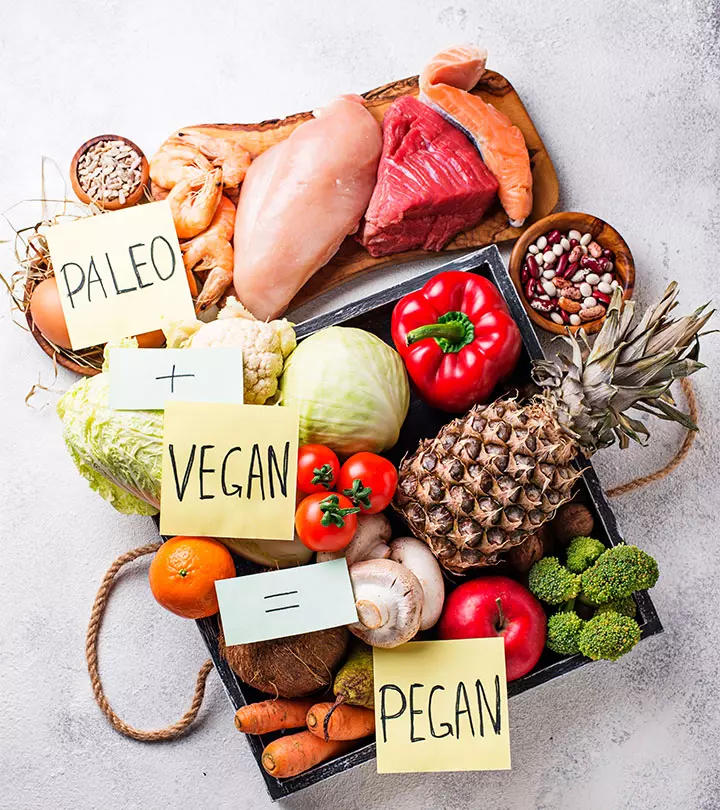The Striking Differences Between Veganism And Vegetarianism

Image: Shutterstock
In a world where dietary choices have become diverse and ethically motivated, two prominent lifestyles have emerged as beacons of change and compassion: veganism and vegetarianism. These paths of conscious consumption have transcended mere diets to embrace a deeper understanding of humanity’s interconnectedness with the planet and its inhabitants. In this article, we embark on a journey to explore the differences between being vegan and vegetarian. Read on to know more about them!
In This Article
Vegan Lifestyle
Being vegan is more than a dietary choice; it is a profound commitment to excluding all animal-derived products from one’s life. Vegans abstain from consuming not only meat but also dairy, eggs, and honey, along with avoiding products that involve animal exploitation, such as leather and fur. The foundation of veganism lies in the unwavering belief that all living beings, irrespective of species, deserve respect, compassion, and freedom. This ethical stance stems from a profound understanding of the suffering endured by animals in factory farms and the environmental impact of animal agriculture. Vegans advocate for a more sustainable and compassionate world, where the circle of life is not severed but embraced in harmony.
Vegetarian Lifestyle
On the other hand, vegetarians opt to abstain from meat consumption while still incorporating dairy into their diets. The choice to be vegetarian is often driven by a diverse range of reasons, such as concerns for personal health, religious beliefs, or environmental consciousness. For many, being vegetarian is a stepping stone towards a more compassionate lifestyle, offering an opportunity to reduce their ecological footprint while still savoring certain animal-derived products. It is an acknowledgment of the power of incremental change, choosing a diet that aligns with one’s values, without forsaking personal health or cultural connections.
1. A Shared Ethical Core
Despite their differences, veganism and vegetarianism share a powerful ethical core that transcends the plate. Both lifestyles are rooted in empathy, compassion, and the desire to create positive change in a world plagued by the consequences of mass consumption and industrial farming.
2. Promoting Positive Dialogue
Rather than viewing these two lifestyles as opposing forces, we should celebrate the shared values that bring vegans and vegetarians together. Engaging in open, respectful dialogue can bridge the perceived gaps between these choices and foster understanding among individuals.
3. Celebrating Culinary Diversity
One of the greatest joys of being vegan or vegetarian lies in the richness of culinary diversity these lifestyles offer. From delectable plant-based meats to sumptuous dairy alternatives, the world of vegan and vegetarian cuisine is a treasure trove waiting to be explored. Both lifestyles encourage creativity and exploration in the kitchen, inspiring individuals to experiment with diverse ingredients and flavors. This culinary adventure opens up new possibilities, allowing people to reconnect with their food and appreciate the beauty of plant-based sustenance.
Benefits Of Vegetarian And Vegan Lifestyle
1. Improved Health
A well-balanced vegan or vegetarian diet, rich in fruits, vegetables, grains, legumes, nuts, and seeds, is associated with numerous health benefits. Studies have shown that these diets can lead to lower risks of many chronic diseases (1).
2. Weight Management
Vegan and vegetarian diets are lower in calories and saturated fats. This makes them effective for weight management. The emphasis on whole, plant-based foods encourages a healthier approach to eating, promoting satiety and reducing overeating.
3. Environment Friendly
Choosing a vegan or vegetarian lifestyle significantly reduces an individual’s ecological footprint. Plant-based diets require fewer resources, such as land and water, making them more sustainable and environment friendly.
4. Animal Welfare
Vegans and vegetarians prioritize the ethical treatment of animals. By abstaining from animal products, they contribute to reducing the demand for factory farming and the exploitation of animals.
5. Lower Risk Of Foodborne Illnesses
Meat and dairy products are more susceptible to contamination and foodborne illnesses compared to plant-based foods.
6. Increased Nutrient Intake
Plant-based diets can be nutrient-dense, providing a wide array of vitamins, minerals, antioxidants, and fiber. With careful planning, vegans and vegetarians can meet their nutritional needs, including protein, iron, calcium, and omega-3 fatty acids, through plant-based sources.
7. Longevity And Anti-Aging
Studies suggest that plant-based diets are associated with increased longevity and reduced risk of age-related diseases. The abundance of antioxidants and anti-inflammatory compounds found in plant foods contributes to healthier aging and improved overall well-being.
8. Compassionate Living
Choosing a vegan or vegetarian lifestyle fosters a sense of compassion and interconnectedness with the world. By making mindful choices, individuals actively participate in a movement for positive change, promoting kindness and empathy towards all beings.
9. Culinary Exploration
Vegan and vegetarian diets encourage culinary creativity and exploration. Discovering a wide variety of fruits, vegetables, grains, and plant-based proteins can lead to exciting, flavorful, and satisfying meals that cater to diverse tastes and cultural preferences.
As we traverse the paths of veganism and vegetarianism, we realize that at the heart of both lies a profound desire for positive change, compassion, and connection. The differences between these lifestyles are nothing in comparison to the shared ethical core that binds them together. By embracing diversity and fostering understanding, we can create a more inclusive world where individuals are encouraged to make choices that align with their values. The journey towards a more sustainable and compassionate planet is paved with a multitude of choices, and each step, whether big or small, is a testament to the beauty of conscious living.




























